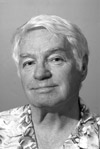Gay as in Happy
Welcome Aboard the USS Wedlock
Who You Calling Gay?: I grew up in Chicago and went through college and the Army without ever meeting a gay person. Or so I thought.
Doubtless I met many in school, while playing football and baseball and in college dorms and Army barracks. But it was not a time when many homosexuals came out to their friends and family or marched in gay pride parades.

I heard the jokes, of course, but then in Chicago there were jokes and rude nicknames for virtually every ethnic, racial, national, and minority group in our patchwork of neighborhoods. As in any city in America. But you were careful. If you called the wrong person a Polack you were very likely to find yourself on your back with a broken nose.
In my teen years my family lived in a Goleta-like enclave, Jeffrey Manor, which was surrounded by neighborhoods where steel mill workers lived. We went to tough schools and knew tough kids, but we were baffled by the racism and intolerance we found in Chicago. Why were people so angry with one another for no good reason?
One summer, I worked in the labor gang at U.S. Steel for $1.36 an hour, with Bohemians, Poles, Lithuanians and just about every other Eastern European nationality. We all got along, but venturing into one of their neighborhoods to visit their daughters was a big no-no.
Still, no gays. Then came the 1960s and the civil rights movement. People marched for the blacks. The nation woke up to the wrongs committed in the name of “tradition.” We’re lightning fast to pick up on new electronic gadgets but glacially slow to question tradition. Until 60 years ago, interracial marriage was illegal even in California. It took 19 more years for the U.S. Supreme Court to change that.
Still, gays were treated as second-class citizens, subject to discrimination and violence. Men wedding men, women tying the knot with other women? Now that would have been a shocker back in my old neighborhood.
But today it’s a different world. Polls show that by and large, most Americans accept the idea of same-sex marriage. Last week the California Supreme Court voted 4-3 to not only legalize same-gender marriage but extend to sexual orientation the same broad protections against bias that applied to race, gender, and religion.
No doubt some across the nation will envision the California Supremes as a bunch of wild-eyed grown-up kids on skateboards. Actually, the court is dominated by staid Republicans. The deciding vote was that of Chief Justice Ronald George, a 68-year-old who recalled seeing “No Colored” signs in the South as a youth. To him, this was a civil rights case.
I really don’t care what other people do in bed and I don’t understand why others are so all-fired interested. It’s certainly not the government’s business.
But now that the California Supremes have ruled that gays have civil rights, a group of people want to snatch them away. They’re working to place an initiative on the November ballot that would in effect overturn the court ruling, making gay marriage unconstitutional. It would also take away such things as civil unions.
But I think Californians have moved on. Even Gov. Schwarzenegger, who twice vetoed legislation to legalize same-sex marriage, opposes the initiative. Look, if people love one another and yearn to climb into the rocking boat of matrimony, let them. If they choose to set out to sea on the USS Wedlock, best wishes.
Fearless Attorney: If Wendy McCaw decides to sue makers of the Citizen McCaw documentary, they’ll likely face a San Francisco defense attorney known as “utterly fearless.” John Keker reportedly charges $900 an hour, but for the Santa Barbara producers, he’d take the case pro bono — free, according to co-producer Rod Lathim. Keker was a Marine platoon leader during the Vietnam War. His left elbow was shot off.
Fr. Virgil Ill: Father Virgil Cordano, pastor emeritus of the Santa Barbara Mission, says the Mission’s rejection of Opera Santa Barbara’s plan to perform an opera there during Saturday’s I Madonnari chalk art festival is “crazy.” Only “sacred” music is now allowed in the chapel. Fr. Virgil, 89, is fighting cancer and weak but resting comfortably at Mission Terrace convalescent home.
Flamenco Banned: On the other hand, Mission fathers say they had nothing to do with a Fiesta committee ban on flamenco dancing next summer at Fiesta Pequena, which kicks off the annual old Spanish Days. A letter from the Fiesta Pequena committee announcing the ban said, “We are guests of the Friars and as we are performing in front of their church, we seek dances that are traditional, and convey a more modest demeanor.” But Al Pizano, president of the Flamenco Arts Festival, said he received a letter from Mission pastor Fr. Daniel saying that no one from the committee had ever contacted the Mission about such a ban, nor was it sought.
Barney Brantingham can be reached at barney@independent.com or (805) 965-5205. His print columns appear on Thursdays, his online columns Tuesdays and Fridays, and keep an eye out for extra columns on other days. Look for Barney’s interview with Father Virgil on Thursday, May 22.



